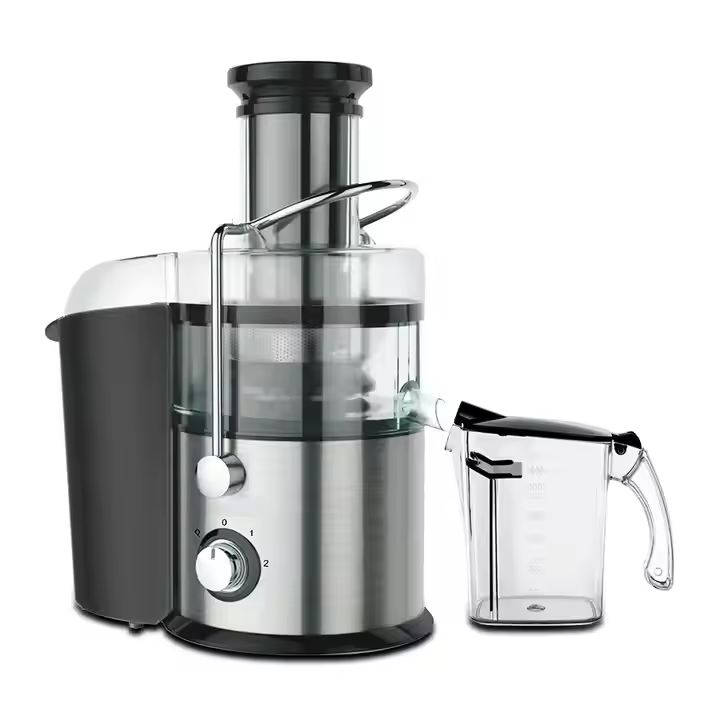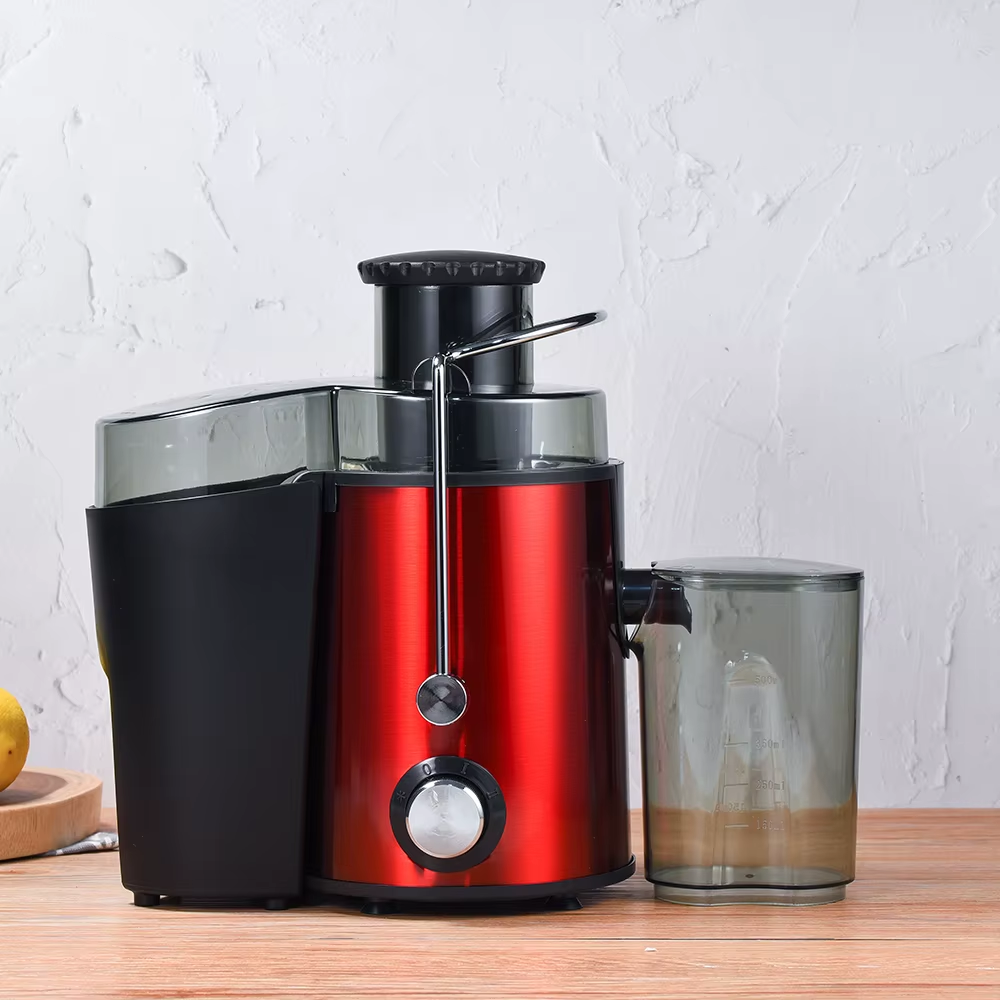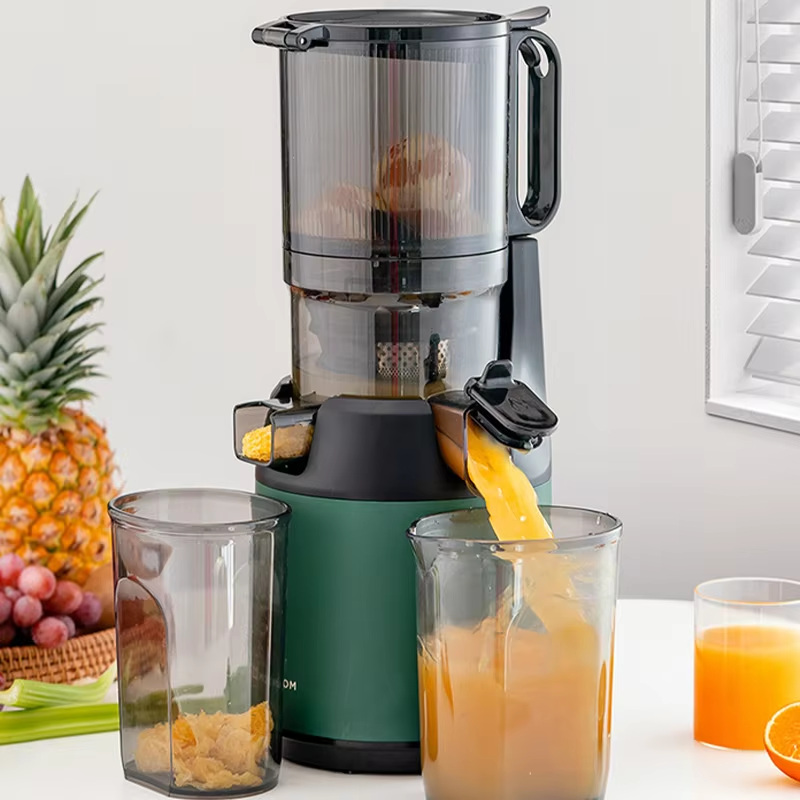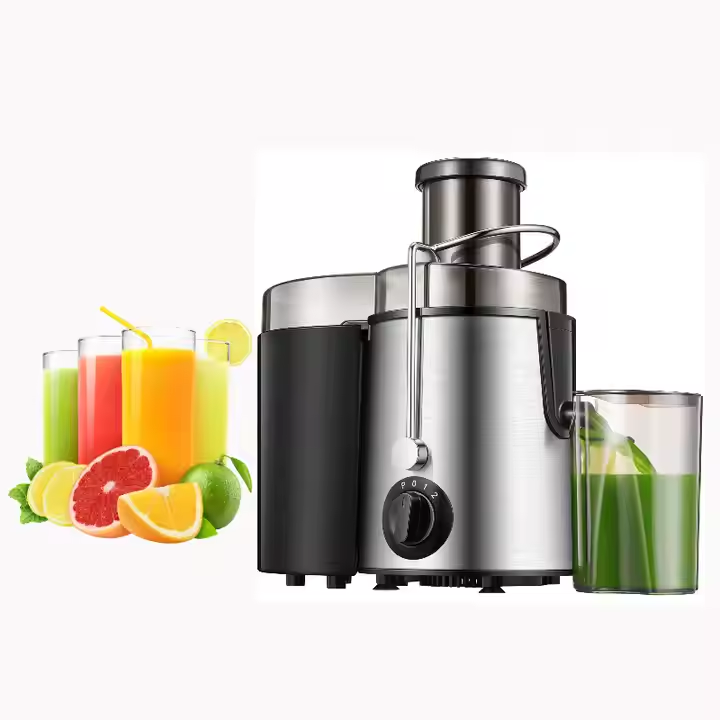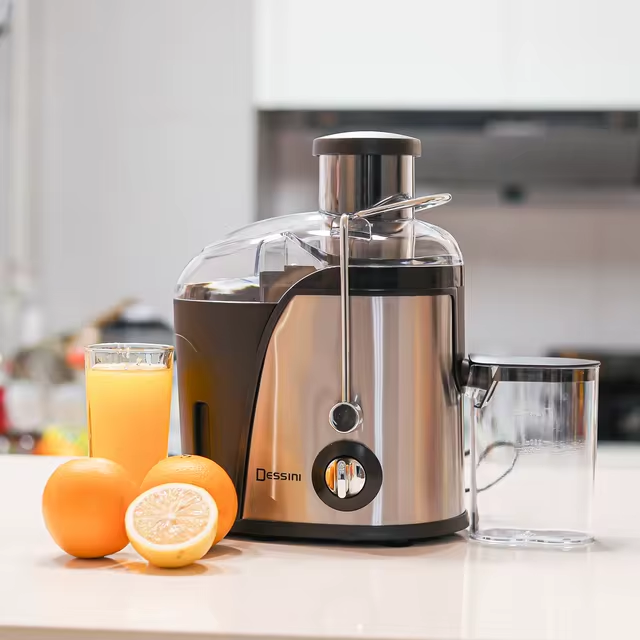
In today’s health-conscious world, incorporating fresh juices into your daily routine has become increasingly popular. A centrifugal juicer is a must-have appliance for anyone looking to boost their nutrient intake effortlessly. This guide explores everything you need to know about centrifugal juicers, helping you make an informed decision for a healthier lifestyle.
Choosing the Right Centrifugal Juicer
Factors to Consider
When selecting a centrifugal juicer, several factors should be taken into account to ensure you choose the best model for your needs:
Motor Power
The motor power of a centrifugal juicer is crucial as it determines how efficiently the machine can process different types of produce. A more powerful motor can handle tougher vegetables and fruits without overheating, ensuring longevity and consistent performance.
Juice Yield
Different models offer varying juice yields. It’s essential to choose a centrifugal juicer that maximizes juice extraction to minimize waste. Look for models with effective shredding and extraction mechanisms for optimal results.
Ease of Cleaning
A juicer that is easy to disassemble and clean will save you time and effort. Look for models with dishwasher-safe parts and minimal components to make the cleaning process straightforward.
Durability and Build Quality
Investing in a centrifugal juicer with robust build quality ensures that it will withstand regular use. Stainless steel components are typically more durable and resistant to wear and tear compared to plastic parts.
Noise Level
Centrifugal juicers can be noisy due to their high-speed operations. If noise is a concern, consider models specifically designed to operate more quietly without compromising performance.
Top Features to Look For
In addition to the basic factors, certain features can enhance your juicing experience:
Variable Speed Settings
Some centrifugal juicers come with multiple speed settings, allowing you to control the extraction process based on the type of produce you’re juicing. This flexibility can result in better juice quality and yield.
Anti-Drip Spouts
Anti-drip spouts prevent juice from dripping down the sides of the juicer, keeping your countertop clean and minimizing mess during the juicing process.
Pulp Control
A centrifugal juicer with adjustable pulp control lets you customize the thickness of your juice. This feature is particularly useful for those who prefer their juice with varying levels of pulp.
Safety Features
Safety mechanisms, such as automatic shut-off and locking lids, ensure that the juicer operates safely, reducing the risk of accidents during use.
Benefits of Using a Centrifugal Juicer
Nutrient-Rich Juices
Centrifugal juicers are designed to extract a high volume of juice, ensuring that you receive a substantial amount of vitamins, minerals, and antioxidants from your fruits and vegetables. Fresh juice can significantly enhance your nutrient intake and support overall health.
Convenience and Speed
One of the standout benefits of centrifugal juicers is their speed. Busy individuals can enjoy fresh juice without spending too much time preparing or cleaning up, making it easier to maintain a healthy routine.
Cost-Effective
While the initial investment in a centrifugal juicer can be higher, it becomes cost-effective in the long run. Preparing your juice at home eliminates the need to purchase expensive store-bought juices, saving you money while providing a healthier alternative.
Versatility in Juicing
Centrifugal juicers can handle a variety of produce, including hard fruits, leafy greens, and even some nuts for making plant-based milk. This versatility allows you to experiment with different recipes and expand your juicing repertoire.
Comparing Centrifugal Juicers to Other Types
Centrifugal vs. Masticating Juicers
While both types of juicers serve the primary purpose of extracting juice, they operate differently:
- Speed: Centrifugal juicers are faster, making them ideal for quick juicing sessions.
- Nutrient Retention: Masticating juicers typically operate at lower speeds, which can result in better nutrient retention and less oxidation.
- Noise Level: Centrifugal juicers tend to be noisier compared to masticating juicers.
- Versatility: Masticating juicers often have more applications, such as making nut butters and sorbets.
Centrifugal vs. Manual Juicers
Manual juicers require physical effort to extract juice, making them less convenient for regular use compared to centrifugal juicers. While manual juicers are quieter and more portable, centrifugal juicers offer greater efficiency and ease of use, especially when dealing with larger quantities of produce.
Maintenance and Cleaning Tips
Regular Cleaning
To ensure your centrifugal juicer remains in optimal condition, it’s essential to clean it immediately after each use. Leftover pulp and juice residues can cause clogging and bacterial growth if not properly cleaned.
Deep Cleaning
Periodically, perform a deep clean by disassembling all removable parts and soaking them in warm, soapy water. Use a brush to remove any stubborn residues, and rinse thoroughly before reassembling.
Preventative Maintenance
Inspect the blade and mesh filter regularly for signs of wear and tear. Replacing these components as needed can prolong the lifespan of your centrifugal juicer and maintain its efficiency.
Storage Tips
Store your juicer in a dry, clean area to prevent moisture buildup and potential mold growth. If space is limited, consider using models with compact designs or easy disassembly for convenient storage.
How to Maximize Juice Yield
Prepare Produce Properly
To achieve the highest juice yield, prepare your fruits and vegetables by washing them thoroughly and cutting them into smaller pieces. Removing any skins or seeds, depending on the fruit or vegetable, can also improve extraction efficiency.
Alternate Ingredients
One effective method to maximize juice yield is to alternate between soft and hard produce while juicing. This technique helps create a cleaner swipe within the juicer, preventing clogging and ensuring a consistent flow of juice.
Clean the Mesh Filter Regularly
A clogged mesh filter can reduce juice yield and slow down the juicing process. Regularly clean the filter during use to maintain optimal performance and prevent any blockages.
Use Optimal Speed Settings
Adjust the speed settings based on the type of produce you’re juicing. Lower speeds work better for leafy greens, while higher speeds are suitable for hard fruits and vegetables. This adjustment ensures maximum juice extraction without overworking the motor.
Troubleshooting Common Issues
Juice Separation
If you notice that your juice is separating quickly after extraction, it might be due to inadequate extraction. Ensure that you’re using fresh produce and that the juicer is assembled correctly for efficient operation.
Motor Overheating
Motor overheating can occur if the juicer is used for extended periods or overloaded with tough produce. To prevent this, limit your juicing sessions to shorter intervals and allow the motor to cool down between uses.
Pulp Clogging
Pulp clogging can be frustrating and reduce juice yield. To avoid this, avoid juicing too many leafy greens at once and clean the mesh filter regularly during juicing sessions.
Inconsistent Juice Flow
Inconsistent juice flow may indicate that the produce is not being fed properly. Ensure that the feed chute is not overloaded and that the produce is cut into manageable sizes for smooth operation.
Recipes to Try
Green Power Juice
Ingredients:
- 2 apples
- 1 cucumber
- 3 celery stalks
- 1 handful of spinach
- 1 lemon
Instructions:
- Wash and prepare all ingredients by cutting them into smaller pieces.
- Place the apples, cucumber, celery, and spinach into the centrifugal juicer’s feed chute.
- Juice the lemon separately and add it to the extracted juice.
- Stir well and serve chilled for a refreshing and nutrient-packed drink.
Tropical Carrot Juice
Ingredients:
- 4 carrots
- 1 orange
- 1 pineapple slice
- 1-inch ginger
Instructions:
- Peel and chop the carrots and orange into smaller segments.
- Prepare the pineapple slice and ginger by cutting them into manageable pieces.
- Feed all ingredients into the centrifugal juicer.
- Mix the juice thoroughly and enjoy the vibrant tropical flavors.
Beetroot Delight
Ingredients:
- 2 beetroots
- 1 apple
- 1 carrot
- 1-inch piece of turmeric
Instructions:
- Thoroughly wash and peel the beetroots and carrots.
- Cut the apple and beetroot into smaller sections.
- Juice all ingredients using the centrifugal juicer.
- Stir the juice and serve immediately for a potent health boost.
Maintaining the Longevity
Regular Inspection
Regularly inspect all parts of your centrifugal juicer for signs of damage or wear. Promptly replacing any damaged components can prevent further issues and extend the machine’s lifespan.
Proper Storage
Store your juicer in a clean, dry place to avoid moisture-related damage. Using protective covers or storage bags can also help keep your appliance in pristine condition when not in use.
Avoid Overloading
To prevent strain on the motor and other components, avoid overloading your centrifugal juicer with excessive amounts of produce. Stick to recommended capacities for optimal performance and longevity.
Use Appropriate Ingredients
While centrifugal juicers are versatile, avoiding extremely hard or fibrous produce beyond the machine’s capacity can prevent unnecessary wear and tear. Refer to your juicer’s manual for guidance on suitable ingredients.
Frequently Asked Questions
Are Centrifugal Juicers Better Than Masticating Juicers?
Centrifugal juicers excel in speed and efficiency, making them ideal for those who value quick juice preparation. However, masticating juicers may offer better nutrient retention and versatility. The choice depends on your specific needs and preferences.
How Long Does a Centrifugal Juicer Last?
With proper maintenance and care, a centrifugal juicer can last several years. High-quality models from reputable brands often come with warranties, ensuring protection against defects and extending the appliance’s lifespan.
Can I Juice Leafy Greens with a Centrifugal Juicer?
Yes, many centrifugal juicers can handle leafy greens like spinach and kale. However, for optimal results, it’s recommended to alternate with harder produce to maintain a consistent juice flow and prevent clogging.
Is It Easy to Clean a Centrifugal Juicer?
Centrifugal juicers are generally easy to clean, especially models with fewer parts and dishwasher-safe components. Cleaning immediately after use helps prevent pulp from drying and sticking, making the process quicker and more efficient.
What Should I Do If My Centrifugal Juicer Isn’t Working Properly?
If your juicer isn’t functioning correctly, first consult the user manual for troubleshooting tips. Common solutions include checking for clogs, ensuring all parts are assembled correctly, and verifying that the motor is not overheating. If issues persist, contact the manufacturer or a professional for assistance.
 Conclusion
Conclusion
Investing in a centrifugal juicer is a significant step towards enhancing your health and embracing a nutrient-rich lifestyle. With their speed, efficiency, and versatility, centrifugal juicers make it easy to enjoy fresh, homemade juices every day. Whether you’re a seasoned juicer or just starting your health journey, the right centrifugal juicer can transform the way you consume vitamins and minerals, supporting your overall well-being. Choose wisely, maintain it properly, and enjoy the myriad benefits that a centrifugal juicer brings to your kitchen and health regimen.
